
SOUNDTRACKS
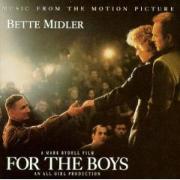
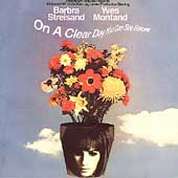
Soundtracks are a lot more than movie music...
...or so I'm ready to argue as a 30 year devotee of this sorely under appreciated genre. So, in an effort to do my part, each week
I'll be making recommendations of soundtracks current and vintage, make a fuss over long awaited soundtrack scores finally getting
a well deserved release, and in general, make some noise about this often overlooked category. Beyond my long experience as a
listener and as a pianist and songwriter, both of which I've put to use in writing a quarterly soundtrack column for the Chicago
Tribune, I can only offer my recommendations. You'll discern my taste soon enough and upfront I'd like to make it clear that I'll
focus most heavily on SCORE soundtracks. In the end, all criticism is subjective but if I can point a listener toward a little heard
soundtrack or strongly advise you to either ORDER IMMEDIATELY or SKIP ALTOGETHER, all the better.
...or so I'm ready to argue as a 30 year devotee of this sorely under appreciated genre. So, in an effort to do my part, each week
I'll be making recommendations of soundtracks current and vintage, make a fuss over long awaited soundtrack scores finally getting
a well deserved release, and in general, make some noise about this often overlooked category. Beyond my long experience as a
listener and as a pianist and songwriter, both of which I've put to use in writing a quarterly soundtrack column for the Chicago
Tribune, I can only offer my recommendations. You'll discern my taste soon enough and upfront I'd like to make it clear that I'll
focus most heavily on SCORE soundtracks. In the end, all criticism is subjective but if I can point a listener toward a little heard
soundtrack or strongly advise you to either ORDER IMMEDIATELY or SKIP ALTOGETHER, all the better.
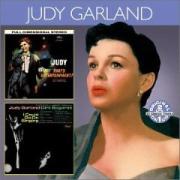
Even gay icons have had their share of financial flops. Judy with her last completed
film, 1962's I Could Go On Singing, Barbra with 1970's On A Clear Day You Can See Forever
and Bette with 1991's For The Boys. But as the respective soundtracks for these often
dismissed "critical" failures reveal -- the movies may have tanked but their leading
ladies were musically at the top of their game. These soundtracks are essentially vocal
showcases for their leading ladies so these are not discs to pick up if you're looking for
the film's music scores. Due to the less than stellar box office of these movies those
have not been made available. And if you have to ask the last name of these gay
icons you might as well not bother picking up these discs -- they're clearly not your
thing!
The week before For The Boys opened during the holiday season of 1991 Bette
appeared on Oprah, who, along with the audience, gushed and predicted Bette was
about to have the biggest hit of her career. Instead, the $45 million musical, produced
by Bette's All Girl Productions was her worst financial disaster ever. Why? Perhaps
audiences just found it hard to warm up to a film that welded schmaltzy nostalgia
songs to the brutalities of war. Maybe it was Bette's character, who, hardened by the
losses in her life, becomes tough as nails and in retrospect, seems angry in just about
every scene. Perhaps the movie was just too old fashioned, a little too steeped in
nostalgia. No matter the reason, the soundtrack finds Bette firmly in charge of the
kind of material she triumphs with. Marc Shaiman's genius musical arrangements,
ranging from big band 40s to minimalist 60s on the Beatles "In My Life" (sung with just
a fender rhodes accompaniment) offer Bette some of the best of her career. The
spirited "Stuff Like That There," the achingly beautiful "P.S. I Love You" and the
infectious "Billy-A-Dick" are just three of the highlights. James Caan, Bette's co-star,
sports a nice light tenor and duets with her on a charming "I Remember You" and
"Baby, It's Cold Outside." And Bette, who let's be honest, has been known to have
pitch problems, rises to the occasion. Vocally she's divine.
The mixed reception that On A Clear Day You Can See Forever received for its star,
Barbra, in 1970 was nothing compared to the raft of bad reviews that greeted the
soundtrack album. Everyone carps about the "dreadful" Yves Montand heavily accented
French vocals and the fact that he's given three complete songs to "butcher." THREE!
Well, I'm about to commit heresy and suggest that Montand does a fine job with his
songs and that it's his STYLE that's so dreadful -- but only when compared to Barbra's.
The wise, lightly humored music hall approach of Montand is about 360 degrees away
from Bab's patented belt. The casting of the two makes sense on paper (the
characters aren't supposed to have anything in common) but on the screen (and side
by side on disc) the craziness of the decision is at once apparent. Like oil and water,
these two singers were never meant to be paired.
So...the film and soundtracks poor receptions have obscured the fact that we are
hearing Barbra at what I think is one of her vocal peaks. There is a warmth to her
voice, an extra "oomph" to the famously long held notes, not to mention a very
attractive playfulness in the comic numbers, that Barbra fans will instantly recognize as
some of her best. This may be one of the last times that Barbra got out of her own
way vocally. A certain knowingness creeps into her vocals in the ensuing period and
though there were certainly many, many vocal triumphs ahead -- very few were less
than calculated.
The greater reason that she does superior work in Clear Day, I think, is also that the
score so perfectly suits her marvelous instrument. It was made to sing standards and
show tunes. Disagree with me on the Montand stuff (I won't be hurt) but for Barbra
fans, there is much more here than just the title song. "Hurray It's Lovely Up Here,"
"What Did I Have That I Don't Have" and "Go To Sleep" are standouts. Alternate takes
of Barbra singing "Melinda" and "She Isn't You" should have been included. Perhaps
one day, along with the original Vincente Minnelli director's cut of the film, it will happen.
Finally, there is the much maligned I Could Go On Singing. Though Judy was found to be
mesmerizing playing a character not far from her own, the soap opera plot about a
concert singer trying to win the love of her now grown teenage illegitimate son was
clobbered by critics. Audiences stayed away from the film which has not just a terrific
Judy performance (including the camp Hall of Fame scene in which she drunkenly baits
Dirk Bogarde into trying to get her to go to the theatre and perform) but also some
examples of that still amazing voice. Judy may have reached her vocal peak with
1954's A Star Is Born but with each comeback and reversal that followed, she learned
new ways to utilize The Voice that was always the center of her universe. Never has a
singer before or since instinctively known when to pull back, push forward, or make
changes in her approach to cover vocal defects -- or highlight new shadings (though
Ella Fitzgerald runs a close second).
The I Could Go On Singing soundtrack is brief -- only five songs -- but Judy delivers
most of them in typical full out style that will please fans. Best, however, is Judy's
plaintive work where she quietly solos accompanied only by a melancholy piano on "It
Never Was You." And the Mort Lindsay orchestrations, the overture and original cue,
"Helicopter Ride" are also fun additions. The soundtrack has been released on a
double CD with Judy's "That's Entertainment," and the disc is a bargain. It contains
more terrific Judy vocal gymnastics from this same period.
+++++++++++++++++++++++++++++++++++++++++++++++++++++++++++++
Don't forget to check out previous soundtrack recommendations by visiting the
ARCHIVES
Next Week: Michael Small's Klute coming to CD at last! An overview of this overlooked
composer and his brilliant 70s scores.
film, 1962's I Could Go On Singing, Barbra with 1970's On A Clear Day You Can See Forever
and Bette with 1991's For The Boys. But as the respective soundtracks for these often
dismissed "critical" failures reveal -- the movies may have tanked but their leading
ladies were musically at the top of their game. These soundtracks are essentially vocal
showcases for their leading ladies so these are not discs to pick up if you're looking for
the film's music scores. Due to the less than stellar box office of these movies those
have not been made available. And if you have to ask the last name of these gay
icons you might as well not bother picking up these discs -- they're clearly not your
thing!
The week before For The Boys opened during the holiday season of 1991 Bette
appeared on Oprah, who, along with the audience, gushed and predicted Bette was
about to have the biggest hit of her career. Instead, the $45 million musical, produced
by Bette's All Girl Productions was her worst financial disaster ever. Why? Perhaps
audiences just found it hard to warm up to a film that welded schmaltzy nostalgia
songs to the brutalities of war. Maybe it was Bette's character, who, hardened by the
losses in her life, becomes tough as nails and in retrospect, seems angry in just about
every scene. Perhaps the movie was just too old fashioned, a little too steeped in
nostalgia. No matter the reason, the soundtrack finds Bette firmly in charge of the
kind of material she triumphs with. Marc Shaiman's genius musical arrangements,
ranging from big band 40s to minimalist 60s on the Beatles "In My Life" (sung with just
a fender rhodes accompaniment) offer Bette some of the best of her career. The
spirited "Stuff Like That There," the achingly beautiful "P.S. I Love You" and the
infectious "Billy-A-Dick" are just three of the highlights. James Caan, Bette's co-star,
sports a nice light tenor and duets with her on a charming "I Remember You" and
"Baby, It's Cold Outside." And Bette, who let's be honest, has been known to have
pitch problems, rises to the occasion. Vocally she's divine.
The mixed reception that On A Clear Day You Can See Forever received for its star,
Barbra, in 1970 was nothing compared to the raft of bad reviews that greeted the
soundtrack album. Everyone carps about the "dreadful" Yves Montand heavily accented
French vocals and the fact that he's given three complete songs to "butcher." THREE!
Well, I'm about to commit heresy and suggest that Montand does a fine job with his
songs and that it's his STYLE that's so dreadful -- but only when compared to Barbra's.
The wise, lightly humored music hall approach of Montand is about 360 degrees away
from Bab's patented belt. The casting of the two makes sense on paper (the
characters aren't supposed to have anything in common) but on the screen (and side
by side on disc) the craziness of the decision is at once apparent. Like oil and water,
these two singers were never meant to be paired.
So...the film and soundtracks poor receptions have obscured the fact that we are
hearing Barbra at what I think is one of her vocal peaks. There is a warmth to her
voice, an extra "oomph" to the famously long held notes, not to mention a very
attractive playfulness in the comic numbers, that Barbra fans will instantly recognize as
some of her best. This may be one of the last times that Barbra got out of her own
way vocally. A certain knowingness creeps into her vocals in the ensuing period and
though there were certainly many, many vocal triumphs ahead -- very few were less
than calculated.
The greater reason that she does superior work in Clear Day, I think, is also that the
score so perfectly suits her marvelous instrument. It was made to sing standards and
show tunes. Disagree with me on the Montand stuff (I won't be hurt) but for Barbra
fans, there is much more here than just the title song. "Hurray It's Lovely Up Here,"
"What Did I Have That I Don't Have" and "Go To Sleep" are standouts. Alternate takes
of Barbra singing "Melinda" and "She Isn't You" should have been included. Perhaps
one day, along with the original Vincente Minnelli director's cut of the film, it will happen.
Finally, there is the much maligned I Could Go On Singing. Though Judy was found to be
mesmerizing playing a character not far from her own, the soap opera plot about a
concert singer trying to win the love of her now grown teenage illegitimate son was
clobbered by critics. Audiences stayed away from the film which has not just a terrific
Judy performance (including the camp Hall of Fame scene in which she drunkenly baits
Dirk Bogarde into trying to get her to go to the theatre and perform) but also some
examples of that still amazing voice. Judy may have reached her vocal peak with
1954's A Star Is Born but with each comeback and reversal that followed, she learned
new ways to utilize The Voice that was always the center of her universe. Never has a
singer before or since instinctively known when to pull back, push forward, or make
changes in her approach to cover vocal defects -- or highlight new shadings (though
Ella Fitzgerald runs a close second).
The I Could Go On Singing soundtrack is brief -- only five songs -- but Judy delivers
most of them in typical full out style that will please fans. Best, however, is Judy's
plaintive work where she quietly solos accompanied only by a melancholy piano on "It
Never Was You." And the Mort Lindsay orchestrations, the overture and original cue,
"Helicopter Ride" are also fun additions. The soundtrack has been released on a
double CD with Judy's "That's Entertainment," and the disc is a bargain. It contains
more terrific Judy vocal gymnastics from this same period.
+++++++++++++++++++++++++++++++++++++++++++++++++++++++++++++
Don't forget to check out previous soundtrack recommendations by visiting the
ARCHIVES
Next Week: Michael Small's Klute coming to CD at last! An overview of this overlooked
composer and his brilliant 70s scores.
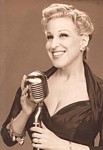
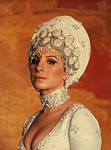
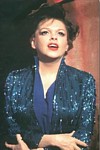
Bette-Barbra-Judy. The
three great gay divas in
character for three of their
film roles -- Bette as Dixie
Leonard, the brash band
singer in For the Boys, Barbra
as Melinda Tentrees, the
English temptress and seer
(who alternates with the
kooky Brooklynesque Daisy
Gamble) in the vastly
underrated On a Clear Day
You Can See Forever and Judy
as Jenny Bowman, a thinly
disguised version of herself
in I Could Go On Singing.
three great gay divas in
character for three of their
film roles -- Bette as Dixie
Leonard, the brash band
singer in For the Boys, Barbra
as Melinda Tentrees, the
English temptress and seer
(who alternates with the
kooky Brooklynesque Daisy
Gamble) in the vastly
underrated On a Clear Day
You Can See Forever and Judy
as Jenny Bowman, a thinly
disguised version of herself
in I Could Go On Singing.
